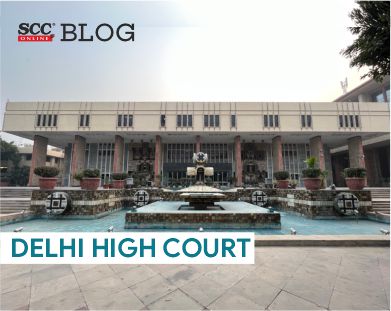Delhi High Court: In a case wherein a Writ Petition was filed under Section 226 of the Constitution of India read with Section 482 of the CrPC for issuance of Writ of Certiorari for quashing the order passed by the State rejecting the application of parole, a Single Judge Bench of Swarna Kanta Sharma, J. allowed the petition and granted four weeks parole to the rape convict and held that the right of a citizen to avail a legal remedy in Supreme Court could not be denied.
Background
In the present case, the petitioner was convicted under Sections 363 and 376(2) of the Penal Code, 1860 read with Section 6 of Protection of Children from Sexual Offences Act, 2012 (POCSO) and was sentenced to undergo rigorous imprisonment for ten years.
Counsel for the petitioner submitted that the petitioner had already undergone incarceration of about 8.5 years (excluding remission) out of rigorous imprisonment for ten years. It was further stated that the petitioner desired to file an SLP for which he had sought parole and an application was filed by the petitioner but the same was rejected by the State (Respondent) as “there were no special circumstances that existed for grant of parole and the convict could file SLP from the jail itself where free legal aid was available to all prisoners”. Further, counsel for the respondent submitted that the petitioner was not entitled to parole in view of Rule 1210 sub-Rule (II) and Rule 1211 of the Delhi Prison Rules, 2018 as the petitioner’s conduct in the jail was not satisfactory.
Analysis, Law, and Decision
Rule 1211 of the Delhi Prison Rules, 2018 mentioned below for reference:
“In the following cases, parole shall not be granted, except, if in the discretion of the competent authority special circumstances exist for grant of parole;
I. to VI. xxx xxx
VII. If the prisoner is convicted under POCSO.”
The Court noted that “Rule 1211 of the Delhi Prison Rules was not absolute since the competent authority had the discretion, even in such cases, to grant parole, provided there existed special circumstances. Though the special circumstances were to be considered by the competent authority, the impugned order did not refer to the special circumstances and that they were found insufficient for grant of parole, rather it only mentioned that the SLP could be filed from the jail itself and that the conduct of the applicant was not satisfactory”. Therefore, the Court held that “the right of a citizen to avail legal remedy in the final court of country, which might often be the last ray of hope, could not be denied on such ground”.
The Court further held that it was also the right of a citizen to effectively pursue his legal remedy in the last court of justice in the county by filing SLP through a counsel of his own choice, which was a valuable right, and this could not be withheld merely based on his past conduct or on the ground that free legal aid was available and that SLP could be filed from the jail itself.
Thus, the Court allowed the petition and granted parole for four weeks to the petitioner.
[Neeraj Bhatt v. State (Govt. of NCT of Delhi), 2023 SCC OnLine Del 32, decided on 5-1-2023]
Advocates who appeared in this case :
For the Petitioner: Advocate Kunal Malhotra;
Advocate Ravinder Gaur;
For the Respondent: ASC Sachin Mittal;
Advocate Nishant Chauhan.
*Simranjeet Kaur, Editorial Assistant has reported this brief.







